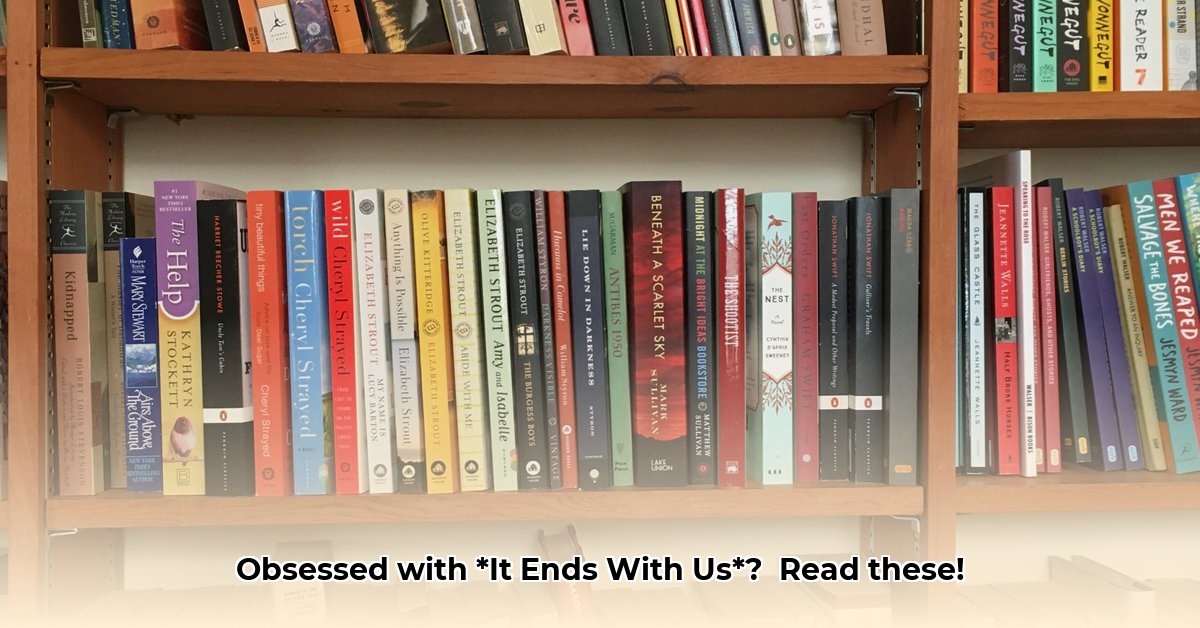It Ends With Us sparked intense discussions about the portrayal of domestic abuse in romance. Its popularity led many readers to seek similar books exploring trauma, healing, and the complexities of love and abuse. This article provides a curated list of books sharing the same emotional depth and important themes. We’ll analyze what makes these books captivating, discuss their strengths and potential pitfalls, and guide you in finding suitable reads. Crucially, we’ll examine why these books matter, how to approach them responsibly, and what to avoid so you can engage with stories about domestic abuse in a powerful yet careful way. For more authors like Colleen Hoover, check out this helpful resource: similar authors.
Books Similar to It Ends With Us: Exploring Love, Loss, and Recovery
If you’ve finished It Ends With Us and are craving more, you’re not alone. Colleen Hoover’s novel initiated a significant conversation, prompting many to search for similar reads. However, navigating these themes requires caution, as we seek compelling narratives that avoid trivializing serious issues.
Understanding the Appeal and Potential Concerns
The success of It Ends With Us and related books highlights a genuine desire for stories addressing difficult subjects. These books provide engaging narratives, relatable characters, and intense emotional experiences. However, some worry that focusing on the dramatic aspects might diminish the severity of abuse. The critical question is: How do we portray these stories responsibly, without harming readers with similar experiences? This is a crucial conversation to have in the literary space.
Defining the Qualities of a Book Similar to It Ends With Us
Before diving into recommendations, let’s identify what makes a book comparable. Are you seeking:
- Strong female characters who triumph over adversity?
- Stories centered on complex relationships and the journey of leaving them?
- Books that emphasize the healing and recovery process from abuse?
- Realistic representations of emotional manipulation and gaslighting tactics?
- Explorations of intergenerational trauma and its impact on relationships?
These nuances matter because some books address these themes with greater sensitivity and depth than others. Exploring similar themes helps the reader connect with the characters on a deeper level.
Top Recommendations: Books Reflecting the Themes of It Ends With Us
Here are some suggestions, categorized by their primary focus. Remember to carefully review book descriptions and content warnings before you start reading. These warnings are essential, highlighting potential triggers and sensitive content. Understanding trauma through narrative storytelling can lead to deeper healing.
| Category | Title | Author | What It’s About | Possible Trigger Warnings |
|---|---|---|---|---|
| Healing & Finding Yourself | Ugly Love | Colleen Hoover | Miles Archer and Tate Collins navigate a friends-with-benefits relationship, confronting past traumas and learning to heal. | Sexual content, discussions of past trauma, emotional manipulation. |
| Escaping Toxic Relationships | Verity | Colleen Hoover | Lowen Ashleigh uncovers dark secrets while ghostwriting for an injured author, revealing a web of obsession, gaslighting, and manipulation. | Mature themes, psychological thriller elements, disturbing content, including depictions of child abuse and violence. |
| Complex Relationships | November 9 | Colleen Hoover | Fallon meets Ben, an aspiring novelist, every November 9th for five years, exploring chance encounters, complicated relationships, and the challenges of trust after experiencing trauma. | Implied sexual content, intense emotions, descriptions of a fire and its aftermath, discussions of physical and emotional scars. |
| Forgiveness and Redemption | Reminders of Him | Colleen Hoover | Kenna Rowan returns home after prison, seeking to reunite with her daughter and find forgiveness, facing the consequences of a tragic accident and the complexities of grief and redemption. | Mature themes, death of a loved one, discussions of grief and loss, themes of guilt and redemption. |
| Family and Loss | All Your Perfects | Colleen Hoover | Quinn and Graham’s marriage struggles with infertility, exploring the pain of loss, the challenges of maintaining love, and the complexities of family. | Emotional distress, depictions of loss related to infertility, marital conflict, discussions of pregnancy and miscarriage. |
| Second Chance Romance | One True Loves | Taylor Jenkins Reid | Emma returns home after her presumed-dead husband appears, forcing her to choose between her new fiancé and the love she thought she lost. Explores grief, love, and the complexities of moving forward after tragedy. | Death of a spouse, grief, emotional distress, infidelity (emotional). |
| Found Family | Knockemout Series (e.g., Things We Never Got Over) | Lucy Score | Naomi Witt arrives in Knockemout to rescue her estranged twin, only to find herself stuck with a niece she never knew existed and entangled with Knox, a grumpy barber who begrudgingly helps her. Explores found family & community. | Strong language, sexual content, depictions of crime and violence, themes of family dysfunction. |
| Coming of Age | Where the Crawdads Sing | Delia Owens | Kya, known as the “Marsh Girl,” raises herself in the North Carolina marshes after being abandoned by her family. She navigates love, loss, and prejudice while facing accusations of murder. A coming-of-age story about resilience and survival. | Isolation, abandonment, prejudice, violence, death. |
| Friends to Lovers | People We Meet on Vacation | Emily Henry | Poppy and Alex, best friends with nothing in common, take annual summer trips together until a rift threatens their relationship. They attempt to rekindle their friendship, confronting hidden feelings and unspoken truths. | Emotional intimacy, discussion of past trauma, themes of friendship and love. |
| Small Town Romance | The Notebook | Nicholas Sparks | Noah and Allie’s enduring love story spans years and social classes, marked by separation, reunion, and the challenges of societal expectations. Explores the power of first love and the enduring nature of true connection. | Separation, class differences, family conflict, illness. |
This list is not exhaustive; many other exceptional books explore these themes.
Reading with Awareness: Prioritizing Self-Care
Reading books dealing with difficult topics can be deeply emotional. For some, it may be cathartic and healing; for others, it can be significantly triggering. Keep the following in mind:
- Content warnings are paramount: Pay close attention to them; they exist to support you.
- Self-care is essential: Take breaks when necessary. You are not obligated to finish a book that upsets you. Practice grounding techniques, such as deep breathing or mindfulness exercises.
- Seek support: If a book evokes challenging emotions, reach out to friends, family, or support groups. Consider connecting with a therapist or counselor.
- Reflect on your triggers: Understand what types of content are most likely to affect you and be prepared to adjust your reading choices accordingly.
- Set boundaries: Limit your reading time if you find yourself becoming overwhelmed. Prioritize your mental and emotional well-being above finishing a book.
These stories can facilitate important conversations, but responsible reading and mental well-being are crucial. Use these books for learning and understanding, not just escapism. The goal is thoughtful contemplation and insight, not merely emotional entertainment. Did you know that reading stories about overcoming adversity can boost resilience and empathy?
How to Identify Gaslighting in Literary Novels
Colleen Hoover’s It Ends With Us sparked important conversations about domestic abuse in the context of romance. The novel highlights the insidious nature of gaslighting, raising questions about whether it does so responsibly. Let’s delve deeper into gaslighting and how it’s portrayed in fiction.
Key Insights:
- It Ends With Us realistically depicts the cyclical pattern of abuse and the challenges victims face in leaving.
- Criticism centers on the potential romanticization of abuse and an oversimplified resolution.
- Understanding how to identify gaslighting in literary novels and similar works, requires critical reading skills and an awareness of manipulative tactics.
- Many readers found the book’s portrayal deeply impactful, initiating vital discussions, while others felt it risked minimizing the trauma of abuse.
- The novel’s popularity on platforms like BookTok amplifies its influence, raising concerns about its impact on vulnerable readers.
Recognizing Gaslighting in Fictional Narratives
Gaslighting is a subtle yet harmful form of manipulation that aims to distort someone’s perception of reality. In fiction, it typically appears as:
- Denial and Distortion of Reality: The abuser denies events that happened, minimizes the victim’s feelings, or twists their words, making the victim question their memory and sanity. Does the character consistently invalidate the protagonist’s feelings or experiences, making them feel “crazy”?
- Shifting Blame and Responsibility: The responsibility for problems is consistently placed on the victim. The abuser avoids accountability for their actions, blaming external factors or the victim’s behavior. Is the protagonist continuously apologizing for or justifying the abuser’s behavior, taking
- In Home Voice Lessons Near Me Offer Expert Instruction - February 2, 2026
- Find Voice Teachers for Adults Near Me to Start Singing Confidently - February 1, 2026
- Local Voice Coaches Unlock Confidence and Technique for Singers - January 31, 2026










